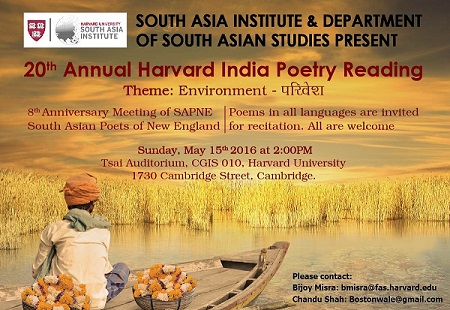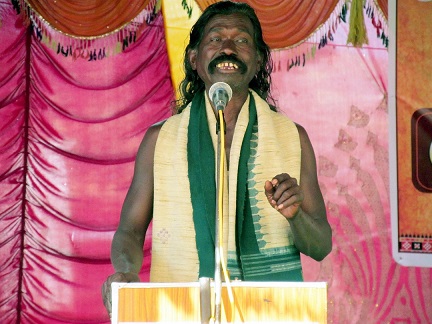Contribute
| Celebration Of Padmasri Haladhar Nag And 20th India Poetry Reading |
Bijoy Misra
05/04/2016
Celebration of Padmasri Haladhar Nag and 20th India Poetry Reading at Harvard University “Nagaâ€s are an old tribe of India. It is believed that they came through the northeast mountains bringing with the culture of Indo-china. Fiercely independent, they populated the river areas. While many moved and integrated to the modern culture, the cultural tradition survived in western Odisha, Chhatisgarh, Jharkhand, Bengal and the northeast. While the British and the anthropologists termed them “tribalâ€, they are the original thinkers of what has come to be known as Indian tradition. This thinking rests on the idea that life has to be observed and the living must be a pleasure. The latter is achieved with the understanding of the grandeur of nature. The 20th India Poetry Reading event at Harvard University coming Sunday, will celebrate the “semi-literate†poet Haladhar Nag, coming from this great tradition of the “Nagaâ€s. Sri Nag had to discontinue school at third grade since he had to work to support the family because of the death of his father. Unlike many, he was lucky to have the rudimentary introduction to letters and sounds. After working as a dish washer for several years, he was offered the job of a cook at a High School dormitory. Sri Nag learned his literature in conversation with the students. Eventually he started composing short poems and recited them in social gatherings. Sri Nag represents the great tradition of oral literature. The language he uses is called Koshali, a dialectical variation of Oriya. From its simple use, one may infer that the language is more like proto-Oriya and could be very old. It is an oral language, rich in metaphorical precision. It is melodious in its rendering. The syllables are not compounded and are rendered clean. The vowels are few and are direct. Like the other oral languages, it did not develop a script. Lately people use Oriya script to document the language. Through the help of the students whom he met in the High School, Sri Nag was nominated for a Padmasri award by the Government of India that was presented to him in January, 2016. In the Award ceremony, he stunned all by showing up bare-foot with his semi-covered body. Later in interviews he explained that walking bare-foot apparently has more hygienic value by virtue of the sole of the foot touching the earth directly. The poet recited all his compositions from memory thus stressing the important dimension of oral literature in Indian tradition. His compositions are all oral. We pay our respects to this native son of India in the India Poetry Reading to be held on Sunday at the CGIS building, 1730 Cambridge Street, Cambridge. The event begins at 2 PM. Thirty poets in various languages would participate reciting their original poem on the theme “Environment.†The program is hosted by the Harvard South Asia Institute and the Department of South Asian Studies in collaboration with South Asian Poets of New England, on organization affiliated with the non-profit group India Discovery Center, Inc. The program is free and all are invited. Here are four stanzas from Sri Nag’s ten stanza poem “That old Banyan treeâ€: Generations have gone by, Grandfathers, their fathers and more, Berries ripe in summer!
Here stands tall,
The big banyan tree,
To the left of that narrow village road!
O’ how big is it?
It has the size of the whole barn!
Branches everywhere, roots protruding down,
Twisted ropes, strong and taut, thus life is born!
Their friends, relatives, and men of yore,
Climbed the tree, swung through free,
Youthful run, juvenile fun, the tree has lived their lore!
Invite the songbirds, other colored tiny flocks,
Market chimes continue morning till evening,
Sharing, gossiping and feeding in family blocks!
You may also access this article through our web-site http://www.lokvani.com/

